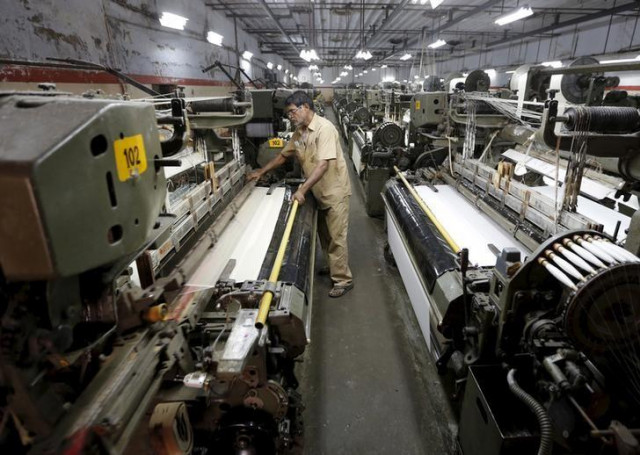Textile industry: Pakistan has opportunity to attract Chinese exporters
If China ships goods to US via Pakistan, it will bring technology, skills

PHOTO: REUTERS
In August, the US revised its tariffs on Chinese products, including textile, and increased them from 10% to 25%. So far, the US has slapped tariffs on $250 billion worth of Chinese products and has threatened tariffs on $267 billion more.
Barring seasonal and cyclical fluctuations, textile products have maintained an average share of about 60% in national exports, according to the Pakistan Economic Survey 2017-18. The sector contributes nearly one-fourth to the industrial value addition and provides employment to about 40% of the industrial labour force. Pakistan, having the advantage of being the fourth largest cotton producer, can join hands with Chinese businessmen.
“When Chinese businessmen will route their exports through Pakistan in joint ventures, using raw material and human resources of Pakistan, they will add to Pakistan’s earnings,” said PBC CEO Ehsan Malik. “It will be a win-win situation. Approximately, Pakistan could make $2-2.5 billion.”
For now, the US has put a ban on fabrics only, but retailers fear the next restriction can be on other textile categories. Thus, they are in search for alternative suppliers and Pakistani businessmen can capitalise on the situation.
If Chinese businessmen bring their fabrics to Pakistan to turn them into finished products (garments) and export them to the US, they will be able to keep their existing clients while on the other hand Pakistan will benefit from value addition.
The PBC CEO suggested that the conversion of fabrics into apparels did not relatively require a long time as “you only need a shade or factory-like premises, machinery and manpower, who can stitch these garments.”
“Pakistan already has basic skills of apparel making, while Chinese businesses can bring value-addition technology and higher skills with them,” Malik said, adding it was an opportunity on which the government and private sector should work. “I don’t think that the US tariff will go away soon,” he said, adding even if it was lifted, the retailers would still not like to rely entirely on China in the future, keeping in view the current tariff measures.
US retailers want to keep products made with Chinese expertise and would like to have supply of the same quality from different countries and Pakistan could be one of them, he said.
“It is a long-term solution as the cost of labour in China is increasing, even the labour cost in western China, which borders Pakistan, is twice that in Pakistan and apparelmaking is a labour-intensive industry,” he said, adding, “In any case, China has an incentive to come to Pakistan.”
China is the world’s biggest textile industry operator and has also a huge internal demand because of its big population. Hence, factories in Pakistan will be able to send back the apparel they make to China along with shipments to the US. Chinese companies are well entrenched but the duty on direct exports from China can push them to come to Pakistan to avail the benefit of lower duties.
“It not just Pakistan, they are looking for other options as well like Ethiopia, Laos, Cambodia as well as Bangladesh and India, to some extent. So all of these countries are struggling to attract Chinese companies,” Mailk said and added, “Pakistani government and businessmen will have to struggle to attract these companies.”



















COMMENTS
Comments are moderated and generally will be posted if they are on-topic and not abusive.
For more information, please see our Comments FAQ